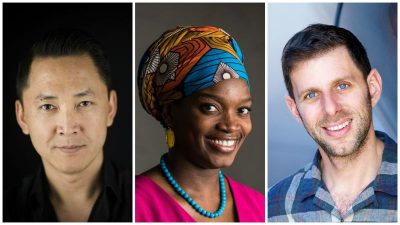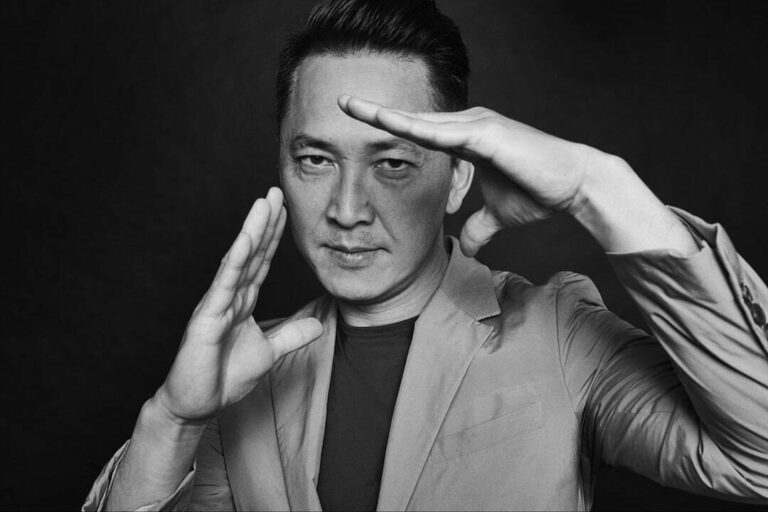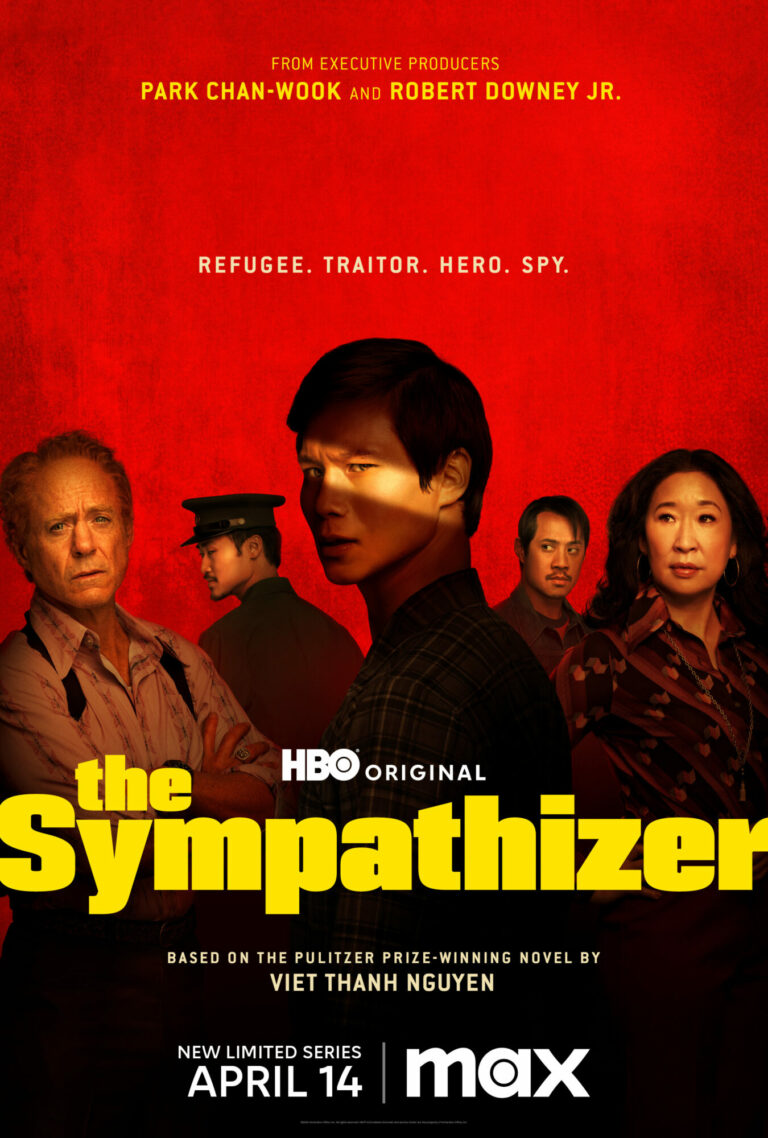Writing for the Los Angeles Times, Deborah Vankin builds a profile on Viet Thanh Nguyen, and a few other 2017 MacArthur fellows.

The 2017 MacArthur fellows have been revealed, and among the honorees are an experimental opera director, a freewheeling novelist exploring the moral complexities of the Vietnam War, a Nigerian painter mining her “Afropolitan” perspective and a gender-bending theater pioneer.
What do these four have in common? All are in Los Angeles. Yuval Sharon, Viet Thanh Nguyen, Njideka Akunyili Crosby and Taylor Mac all are based in the city or are staging work here, turning this year’s MacArthur fellows class into another sign of a shift west for American arts and culture influencers.
The annual no-strings-attached awards of $625,000 per person — often called genius grants — are given to “extraordinarily talented and creative individuals as an investment in their potential,” said the John D. and Catherine T. MacArthur Foundation. Fellows span the worlds of science, business, education and beyond.
This year’s 24 fellows, who were announced late Tuesday (Pacific), include Sharon, whose L.A.-based opera company the Industry staged the 2015 roaming production “Hopscotch: A Mobile Opera for 24 Cars” in various locations in and around downtown. Next month, Sharon, 37, who also holds the title artist-collaborator at the Los Angeles Philharmonic, will direct the world premiere of Annie Gosfield’s “War of the Worlds,” based on Orson Welles’ 1938 fake news broadcast about a Martian invasion.
The foundation awarded Sharon for “expanding how opera is performed and experienced through immersive, multi-sensory and mobile productions that are infusing a new vitality into the genre.”
Nguyen, 46, a book critic-at-large for the Los Angeles Times and a professor at USC, won the 2016 Pulitzer Prize for fiction for his tragicomic debut novel, “The Sympathizer.” His work in fiction and nonfiction explores the Vietnam War and the greater refugee experience. The MacArthur Foundation honored him for “challenging popular depictions of the Vietnam War and exploring the myriad ways that war lives on for those it has displaced.”
“I feel a deep sense of humility; because I know there are many other writers in the contemporary moment who deserve this award, and many writers in the past who should have gotten it who didn’t,” Nguyen said. “And I think about those writers who came at a time when the award didn’t exist whose work made my own possible. It makes me appreciate this even more.”
Theater artist Mac, 44, a Laguna Beach native now based in New York, has been in Southern California recently to develop “A 24-Decade History of Popular Music” for presentation in Los Angeles in March. The 24-hour-long show, a finalist for the Pulitzer in drama this year, will have Mac in drag charting the history of activism and music in the U.S. The MacArthur Foundation recognized the artist for “engaging audiences as active participants in works that dramatize the power of theater as a space for building community.”
Lesser known is Los Angeles painter Njideka Akunyili Crosby, 34, who grew up in Nigeria but has spent the last 17 years studying and working in the U.S. Her large-scale artworks often address the dualities of living between two or more cultures and, as the MacArthur Foundation put it, “the complexities of globalization and transnational identity in works that layer paint, photographic imagery, prints, and collage elements.”
Akunyili Crosby said in an interview that her work “explores the different histories you carry with you and how you navigate straddling two or multiple disparate spaces.” She plans to use her award money to travel to Nigeria for research.
“I’d like to go back and spend a substantial amount of time there. Taking photographs is important for my work,” she said. “Also, a big part of my practice is about exploring what painting means for me. How can you expand this tradition of pigments on a surface? So, it’ll be nice for me to be freed up financially to just spend time in my studio without the pressure of having to make finished work. I can just experiment.”
The MacArthur spotlight on a painter, writer, opera director and theater artist all working in Los Angeles coincides with a new classical music season noted for something of an “L.A. Phil Effect.”It also follows two remarkable years in the visual arts scene, during which the city has seen the opening of the Broad museum, the Marciano Art Foundation and the Institute of Contemporary Art, Los Angeles, with plans moving forward for the Lucas Museum of Narrative Art, the motion picture academy’s museum, a new building for the Los Angeles County Museum of Art and expansion of the Hammer Museum.
Beyond the L.A. angle, this year’s MacArthur class includes New Orleans novelist and memoirist Jesmyn Ward, 40. Ward won the National Book Award for fiction in 2011 for “Salvage the Bones,” which follows a poor African American family in rural Mississippi in the days leading up to — and through — Hurricane Katrina.
Music honorees include Connecticut-based composer and musician Tyshawn Sorey and North Carolina-based singer-songwriter-instrumentalist Rhiannon Giddens. When Sorey, an assistant professor of music at Wesleyan University in Middletown, Conn., performed at this year’s Ojai Music Festival, Times music critic Mark Swed called him “a force of nature, unstoppable.”
Giddens, 40, trained as an opera singer before transitioning to traditional American roots music and co-founding the band the Carolina Chocolate Drops. In his interview with Giddens last year, Times staff writer Randy Lewis wrote that she had “boldly ignored the lines that sometimes separate country from soul, pop from gospel, bluegrass from cabaret, blues from art songs.” She is scheduled to perform Oct. 25 at Walt Disney Concert Hall.
New York playwright Annie Baker, 36, whose “The Flick” won the 2014 Pulitzer Prize, was recognized for “mining the minutiae of how we speak, act, and relate to one another and the absurdity and tragedy that result from the limitations of language.”
For the first time in its 36-year history, the MacArthur awards has recognized a landscape architect: Kate Orff, 45, based in New York and honored for “designing adaptive and resilient urban habitats and encouraging residents to be active stewards of the ecological systems underlying our built environment.”
Orff is a good example that this year’s fellows in particular don’t fit into neat categories or boxes, said Cecilia Conrad, a managing director of the MacArthur Foundation. Instead, Conrad said many fellows are “the interstices of the domains,” citing Orff as a landscape architect also working on sustainability.
The interstices definition also applies to Berlin-based Trevor Paglen, 43, a conceptual artist and geographer whom Conrad described as “a photographer interested in this issue of how we can use technology to see things that would normally be hidden to us,” and to New Jersey designer Damon Rich, 42, whom Conrad called “an urban planner engaged in behavioral science.”
Chicago-based photographer Dawoud Bey, 63, is known for his large-scale portraits, often of marginalized individuals. For his 1992 photographs of high school students, he worked in a semi-open studio and involved his subjects in the creation of their portraits.
That so many of this year’s fellows came from the arts world wasn’t planned, Conrad said.
“We don’t start out with a notion of a theme,” she said. “We look for people who are exceptionally creative who are pushing boundaries.”


